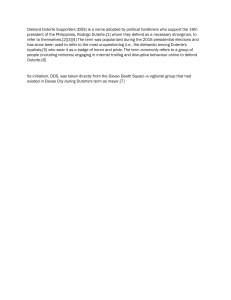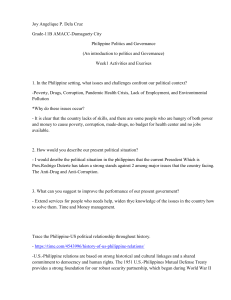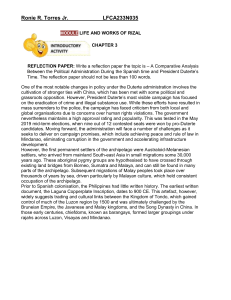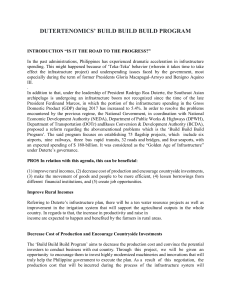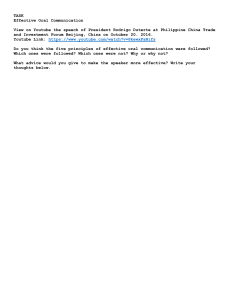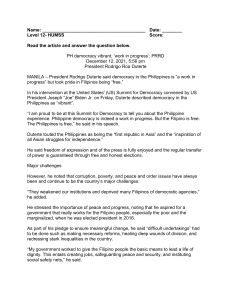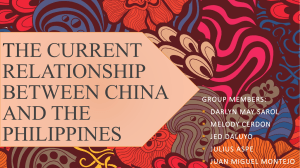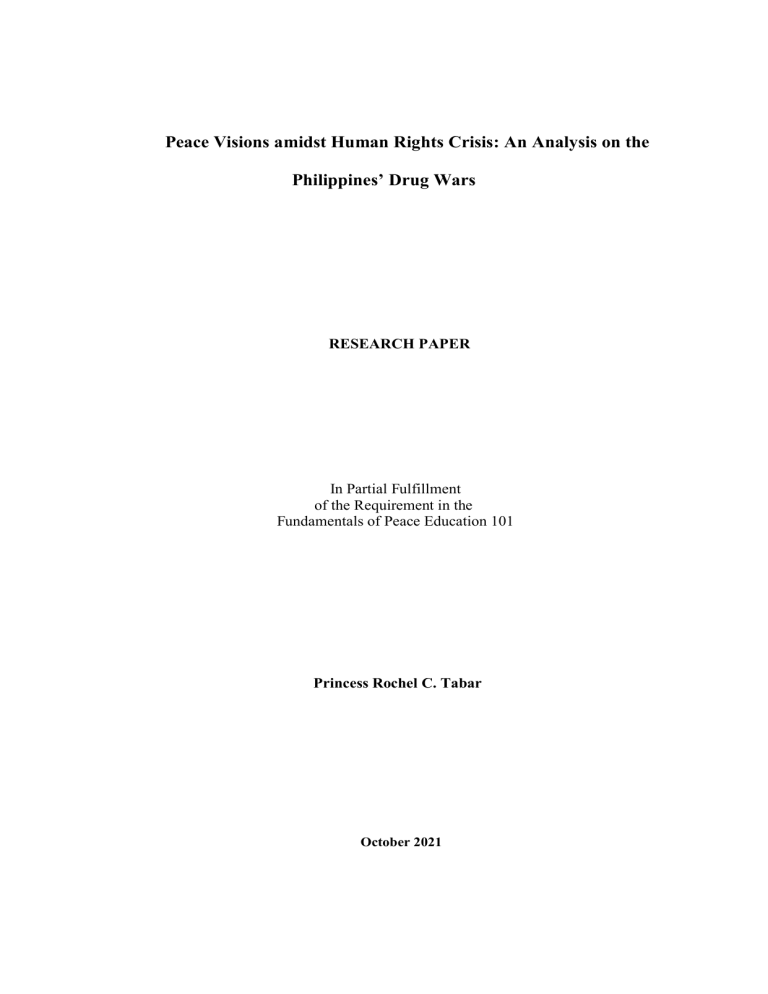
Peace Visions amidst Human Rights Crisis: An Analysis on the Philippines’ Drug Wars RESEARCH PAPER In Partial Fulfillment of the Requirement in the Fundamentals of Peace Education 101 Princess Rochel C. Tabar October 2021 Background of the Study Peace is one of the most commonly used but divisive terms in today's politics. Peace, according to certain politicians, is a goal that may be reached by escalating governmental aggression. Leaders of wealthy nations use peace and other presumably noble goals like democracy, stability, and security to justify foreign military intervention in vulnerable countries, often in the global South. Johan Galtung (1969, 167), argues in his widely referenced book on peace that one of the most important ways to define peace is to describe it as the absence of violence. However, this approach of defining a concept through negation is problematic, in part because it fails to adequately establish the concept’s essential factual qualities and the context in which peace is meant to exist. Humans are not strangers to war. It has been mentioned from history to the present, and many philosophers have wished to explore the significance of war and its harmful consequences. Thus, merely by the virtue of being human, everyone is entitled to certain fundamental rights. Human rights are rights we have simply because we are humans; any state does not grant them. We all have these universal rights, regardless of nationality, sex, national or ethnic origin, color, religion, language, or another status. They extend from the most basic - the right to live - through the rights to food, education, job, health, and liberty, which make life worthwhile. In 2020, the Philippines' human rights situation and peace making deteriorated. Following President Duterte's victory in 2016, respect for human rights and civil freedoms swiftly declined, with thousands of people killed by police and vigilantes in his war on drugs and criminality (BTI, 2018: 3). Although the Philippines has adopted human rights treaties and has mechanisms to enforce them (such as a national human rights commission and human rights offices in the police and military), they were ignored (Conde, 2019b). The military and police have been given more extraordinary powers under Duterte's authoritarian stance, while human rights advocates and opponents have been targeted, harassed, and silenced. Under the name of the drug war, there is widespread impunity, and Duterte has assured law enforcement officials implicated in atrocities that the law would not punish them (Conde, 2019b). Since 2016, "just one instance - out of the official death toll of around 6,600 and various estimates of 27,000 - has resulted in the criminal conviction of police personnel" prosecuted under the war-on-drugs program. Duterte has also targeted human rights advocates, union employees, and general detractors (e.g., Conde, 2018c). Duterte campaigned on a pledge to eliminate crime, poverty, and corruption in the nation, all of which he attributes to narcotics. As a result, drugs are a big issue in the Philippines. That is why Duterte launched a war on drugs, dubbed 'Project Tokhang.' Duterte first vowed to eradicate drugrelated crime within six months, but he quickly confessed that he required additional time (NU, 2016a). However, his objective is to establish 'security' by defending 'decent citizens' against crime, poverty, and corruption (Kaiman, 2017). Violence is used as a "display to intimidate criminals while ensuring 'good folks' of their safety." Duterte's fight on narcotics should protect residents' safety. The question is thus whether the country's feeling of security has improved since the drug war began. Duterte's main plan centered on three primary policy goals. First, he promised to advocate for a transition from the existing centralized government structure to a wholly federalized one. This gives provincial government’s additional power to manage their affairs in ways that the current system does not allow (Casiple 2019, 180). While this agenda is predictable, given Duterte's status as the first regional politician to be elected straight to the country's highest elected position, the proposal in favor of federalism also highlights the country's post-1986 electoral democracy system's flaws. Duterte and his allies specifically attacked past election governments following the collapse of the Marcos dictatorship for failing to provide the socio-economic advantages of liberalization to all segments of society, branding such a democratic system as elitist (Thompson 2016). Second, Duterte's policy agenda marked a change away from relying on the US as a security guarantee and toward a deeper bilateral engagement with China. Third, Duterte's main objective includes his "war on drugs," which has resulted in the country's greatest state-initiated human rights catastrophe in contemporary political history (Simangan 2017). The government of Rodrigo Duterte characterized the drug war as a necessary and effective reaction to the growing use of illicit narcotics, particularly methamphetamine and cannabis. Despite "decades of drug control," the incidence of drug usage, notable methamphetamine, is increasing across Southeast Asia, particularly in the Philippines (Lasco 2018, 40). While drug addiction is a significant issue in the Philippines, victims of this social scourge face poor public health and rehabilitation services. Duterte claims that the Philippines' illegal drug problem poses apocalyptic threats to society and has destructive effects on individuals and that the only way to combat such an impending disaster is for his administration's state violence-focused approach to extrajudicial killings of all suspected criminals and drug users to be vigorously implemented (Barrera 2017, 350). Instead of tackling the drug problem as a public health concern, the Duterte government used the state's coercive machinery to murder and harassed those suspected of dealing illegal narcotics. The Philippine government has denied involvement, claiming that the Tokhang campaign was not a plan of extrajudicial murders but rather a program of registering, speaking with, and treating drug addicts, as the name implies. The administration also attempted to deflect blame for the numerous deaths by emphasizing criminal infighting and unsolved murders instead of police killings. However, evidence is growing that Tokhang watchlists have been converted into kill lists (Human Rights Watch 2017). This has sparked intellectual and political discussions regarding the startling return to authoritarian control and the emergence of lethal sovereignty (Reyes 2016), in which people judged "disposable" (Tadiar 2013) can be assassinated without consequence (Agamben 1998). Tokhang, which translates to "knock and beg," refers to local authorities warning drug users and encouraging them to engage in the drug recovery process. Duterte argued that politicians, military and police personnel, and ordinary citizens in distributing illegal narcotics facilitate the breakdown of political order. He said that widespread unlawful drug use is to blame for various crimes, acts of social deviance, and other socio-economic issues, including poverty. In Duterte's opinion, Illegal narcotics are the root cause of long-standing societal problems, including poverty, political corruption, and economic instability (Regilme 2016). "The problems that bedevil our country today that need to be addressed with urgency are corruption, both in the high and low echelons of government, criminality in the streets and the rampant sale of illegal drugs in all strata of Philippine society, and the breakdown of law and order," Duterte (2016b, 12) said in his first public speech after taking office in June 2016. Duterte (2016), in reaction to the urgency of the drug crisis, cited state violence as the sole solution: "these sons of whores are killing our children, I tell you, even if you're a cop, don't go inside it, because I'm going to murder you... If you know of any addicts, murder them personally since convincing their parents would be too agonizing”. Duterte highlighted the Philippines' shortcomings in tackling socio-economic problems such as material inequality and political corruption by portraying illicit drug users as the most severe existential threat to the Philippine political order. This oversimplified portrayal of the country's long-standing issues connected to illegal narcotics drew some sympathy from Duterte's supporters. The drug war waged by the Duterte government was justified through various conceptual processes (Johnson and Fernquest 2018, 363). Duterte's language and policy discourses advocate the assassination of everyone implicated in narcotics trafficking. The life of accused criminals was undervalued by Duterte, who said that "there's a humpback of a difference between murdering an innocent person and killing a criminal...they ought not to be combined" (Ranada 2017, 20–21), and argued that the victims of the drug warfare were criminals who deserved to die. Second, police officers carry out fraudulent buy-bust operations in which the intended suspects were falsely accused of violent resistance and slain. Third, police operatives and suspected state-sponsored assassins seek all targets and murder them in ways that reveal acts of governmental terrorism in a systematic but covert manner. In reality, the line between a buy-bust and a typical extrajudicial killing is blurry because "if the victim didn't have a pistol, one could be provided to him after he was killed—and it regularly is" (Johnson and Fernquest 2018, 363). Without adequate court-sanctioned verification and arrest warrants, the war on drugs targeted any suspected drug users and traffickers (Reyes 2019, 111–112). State agents used two main techniques in Duterte's drug campaign. First, they identify suspected drug traffickers, users, and accused offenders methodically, releasing their identities to the media. Second, state agents fiercely explain the killing of those suspects as unavoidable while publicly humiliating the suspects' relatives and friends by placing banners on the deceased targets indicating that they deserve to die for their drugrelated participation. Such strategies also rely on demonstrating the alleged efficacy of state violence in promoting order and peace in a society where, according to Duterte, human rights and democratic government have supposedly failed (Reyes 2019, 111). Duterte has political backing from individuals who feel that the only way to fix the country's law and order crisis properly is to rely entirely on state brutality while disregarding democratic norms and human rights obligations. Duterte reduces the chances of a coup attempt. In particular, 46 retired high-ranking military and police officers were given ministerial posts (as Cabinet Secretaries) and other influential positions in various government agencies and government-owned corporations (Gita 2019), implying the administration's attempt to quell the possibility of a coup against Duterte's leadership. The bulk of these retired military and police personnel hail from Duterte's electoral stronghold in the Philippines' South. Furthermore, the upper- and middle-classes support is critical to the Duterte regime's survival, especially since such powerful class groupings might pool their resources and influence to destabilize an incumbent presidential government. The Duterte government obtains the favor of the elite and middle class by presenting them with an (although deceptive) sense of security and protection, while the majority of the victims of the drug war come from extremely impoverished backgrounds (David et al. 2018; Go and De Ungria 2019). The war on drugs also attempts to solve poverty by killing poor people to strengthen wealthy elites' support for Duterte while dismissing the validity of nonviolent measures. In particular, the police and state specialists fundamentally carried out their killing tasks in the monetarily poor ghettos of Metro Manila and other undeveloped rustic regions in the territories, focusing on helpless Filipinos (Barrera 2017; Coronel, Kalaw-Tirol, and Pimentel 2019). Duterte's talks instrumentally assert that harmony relies upon law and order and the powerful arrangement of essential security. Duterte claims that the conflict on medications could produce peace necessary for a sound financial turn of events. In his 2017 State of the Nation Address (SONA), Duterte (2017, 11) guaranteed that the "economy floods just when harmony and request are winning in where financial backers can pour [in] their capital and ability" and alluded to his achievements in the confined conflict on drugs in Davao City during his time as its City Mayor. In a similar speech, he stated that the "battle against illicit drugs will continue because that is the underlying driver of so much evilness that debilitates the social texture and discourages new ventures from pouring in...the battle will be everlasting as it will be implacable battle will be unremitting as it will be unrelenting" (Duterte 2017, 12). "Our people in the open country would not experience formative increases if we can't preserve law and control," Duterte (2019, 47) continues: "Yang harmony and security, wala "yan. [peace and security are nothing]...we need to uphold the law." (2019, Duterte). However, Duterte's plan is known for its irregularity and internal strife. Duterte (2019, 65) promised in a similar SONA speech that he "would do [handle the disagreement] in a calm manner, aware of the fact that it is our public pride and regional trustworthiness that is at stake." The striking difference between Duterte's handling of the illegal drugs crisis and the South China Sea dispute suggests a lack of consistency in using state brutality. The center's goal, according to Walden Bello (2017, 83), was "not to win the drug war," but rather "to advance a more extensive dictator plan by creating an environment of terrorizing and dread that will lead to the utter destruction of majority rule political organizations...and, more importantly, their revamping into an autocrat was bearing a stroll in the recreation center'." As a result, the drug war's logic was also based on Duterte's demand for system unity and a broader network of allies. The relating analysis revealed two strands of thinking about the Duterte administration's views on peace building. On a deeper level, harmony refers to a scenario in which the Philippine government exerts complete control over undervalued groups, particularly the physically weak, to protect the interests of capital and the elites' wealth. Harmony, in this context, refers to state security, which includes the influence of the decision-making official organization and wealthy world-class partners. Peace, in this perspective, excludes the potential of the needy persons from state brutality, as they remain primary targets of the drug war with no reaction to procedural equality and rehabilitative offices, particularly for those who are addicted to a drug. The Duterte administration employs many methods to promote such an elite view of harmony. First, It reorients the state apparatus as a weapon of savagery, rather than assisting the state's everyday freedoms and responsibilities to its citizens; instead, state brutality solely serves the interests of the official system's union of power supporting the interests of its decision-making affluent elites. Second, the state's discussions intend to dehumanize poor people who have been labeled as deserving of death due to real concerns about state security. In accordance with the circumstances stated above, this study aims to aid understanding of the Philippines' War on Drugs from the frame of perspective of peace education and its potential role relevant to the crisis. As a result, the researcher utilizes the conflict tools from the PDF; Conflict Analysis Handbook – Fabio Oliva and Lorraine Charbonnier, to help further reach the in-depth of the study and use the prism of peace education to assist possible occurrences. The researcher intends to connect the conflict issue to peace education by addressing the following question: How can peace education contribute to resolving such conflict and suppressing it from reoccurring? The Philippines' conflict on drugs campaign grabs the eye of all conceivable far-reaching news, such as; Social media sites, News articles, and Radio/Television broadcasts. Moreover, to explore and extend the perception of the conflict, the instruments designed were taken advantage of below. Situation Profile: Tool no. 1 - Timeline The Philippines has a lengthy history of conflict, specifically in the kind of Governance, with two long-running rebellions and other forms of disagreement and brutality that have fluctuated and evolved throughout time. Following independence (in 1946), the Philippines had a stable economy with constant financial progress. Throughout the 1960s and 1970s, viciousness and instability increased as a cross-country socialist uprising began and Moros in the southern Philippines launched an equipped resistance (Asia Foundation, 2017). Dictatorship control was replaced by a vote-based system from 1972 until 1986, yet after the social movement mobilization “People Power Revolution” in the same year, multi-party elections began up to 2000s. Hence, "electing misrepresentation, defilement, and overthrow attempts continue to harm public governmental concerns". In 2016, the war on drugs campaign started, which then embody the history of violence in the Philippines. The Philippine police are not acquainted with the practice of salvaging — a phrase that dates back to the time of martial law from 1972 to 1986 and the counter-insurgency campaigns against Maoist, Moro, and Islamic movements during the 1990s and first decade of the 2000s (McCoy 2009; Altez and Caday 2017). As part of an ethological theory, police officers constructed a binary world of angels and demons to morally legitimize extreme forms of violence about which the public was relatively neutral: while civilians identified receivers as the greatest danger, they also condoned and even participated in violence – for example, against José. When the police officer, invoking devils and angels, insists on fighting crime regardless of the cost, he refers to the possibility of prosecution if he is caught in the act. This threat, however, was effectively eliminated by Duterte's war on drugs, at least unofficially. Based on this tool, the dispute worsened after the state was granted its independence, from the economic rise to the political aspects of history. The proposition on behalf of federalism also highlights the flaws in the electoral democracy system since 1986. The specific criticism directed at past election governments following the fall of the Macros dictatorship that they had failed to spread the socioeconomic gains of liberalization throughout society, therefore portraying a democratic system as being arrogant. Duterte's policy agenda marked the beginning of the country's transition away from reliance on the United States as a security guarantee and toward a much tighter bilateral engagement with China. The "war on drugs," which is the cornerstone of Duterte's agenda, has resulted in the greatest stateinitiated human rights catastrophe in the country's contemporary political history, as well as the worst economic crisis in the country's history. Causal Analysis: Tool no. 8 - Conflict Tree Drugs are a significant issue in the Philippines. In order to address crime, poverty, and corruption in the country, the government blames it on the usage of illegal drugs. In connection to this, the president's endless war to eradicate narcotics in the country has resulted in a daily death toll that is fast increasing. Nonetheless, it is a major problem among the poor, and there is a high level of drug involvement among children and adolescents, including illegal drug use, sale, and trafficking (Njord et al., 2010). According to Matt Wells of Amnesty International (2017), the underprivileged population is heavily involved in drug usage since drugs are easy to produce money. Duterte classifies 'his people' into two categories. The first category includes drug dealers, addicts, and criminals. Viewed as violators of the law, a threat to social welfare, and a hindrance to economic progress. The second category includes law-abiding, God-fearing citizens. They are viewed as victims of violence, citizens necessary for economic growth, and the foundation for future generations' well-being. Duterte asserts that the first group must be eliminated to protect the second, as this enables him to "care for law-abiding, God-fearing young people... because they are our resources" and "slaughter the idiots for destroying his country." Disabling the first group protects the second group's safety, public safety, and law and order (Reyes, 2017). Thus, violence is used as a "display to frighten criminals while ensuring 'good folks' of their safety." This act may cause psychological and emotional trauma, not only to the alleged criminals but also to their families and the threat to the security of all civilians. The vast majority of the casualties were people living in slums who were financially underprivileged. According to a study conducted by two Philippine universities and Columbia University's Stabile Center, 40% of the killings took place in Metro Manila's slums (between May 2016 and September 2017), and the victims were "typically tricycle drivers, laborers, vendors, farmers, jeepney barkers, garbage collectors, or were unemployed" (Coronel, Kalaw-Tirol, and Pimentel 2019, 3). Between 2016 and 2018, state operatives killed about 5,000 people in the Philippines, according to official figures from the Philippine National Police (Ball et al. 2019, 3). In June 2019, the Philippine police contradicted their prior statements, claiming that state agents murdered 6,600 people during antidrug operations (Maitem 2019, 2). In addition, about 30,000 people were assassinated employing the "riding-in-tandem" strategy, which includes two masked or hooded assassins riding in a motorbike, apparently on behalf of the state, and generally regarded as state-sponsored operatives (Maitem 2019, 3). The war on drugs has a wide range of adverse effects. One unfortunate result is that innocent civilian are murdered alongside drug traffickers, users, and criminals (Phillips, 2016). The assassination of unarmed civilians is not a crime nor a result of carelessness or recklessness based on Duterte's assertions. Instead, he claims it is only 'collateral damage' (Al Jazeera, Phillips 2016). As a result, fear rises among 'good' residents and drug dealers/users in the community. The increase in the number of persons in terror may be observed in the rising number of prisoners, where approximately 60,000 individuals voluntarily went to prison after hearing the news in July 2016. The jails are becoming overcrowded that there isn't enough room for everyone. Despite this, some still wish to be imprisoned, for they believe they are safer inside the prison than on the streets (Margan & Groom, 2016). The government needs to clarify that the human rights constitution applies to all Filipino citizens, including those the police may label "lawbreakers." The Duterte administration must advance workable strategy proposals on criminal justice and wrongdoing control to its poor public health and rehabilitation services. Re-evaluate healing equity standards that recognize that the issue of guilt and substance addiction is a complex and foundational one that frequently requires a snare of financial strains beyond an individual's control. Duterte's recommended solution for "just murdering the imbeciles" rather than restoration, which he mocks for being a Western concept founded on being "soft," requires testing. There is considerable majority rule room for cultivating conversations on these subjects. The moral wrongness of public discourse, notably on Duterte's war on drugs, has suffocated even the most absurd opposition to the authority narrative. The war on drugs is a breach of human rights. Even the most terrible of criminals possess inevitable human rights that no state may deprive them of. This is mainly for people who have not yet encountered the criminal justice system and should be regarded as innocent until the State establishes their guilt. A reasonable and realistic solution must have been developed without sacrificing human rights protections. The fundamental issue is the police's impunity and its alleged chief enabler, the president, in his presumably "war on drugs." This is a severe issue that requires collaborative action from all members of society, not just human rights advocates. Stakeholder Analysis: Tool no. 15 – Stakeholder Mapping The prevailing war on drugs opposes the global rule of law norms, including responsibility, reasonable judicial decisions, transparent governance, and fair conflict resolution. Numerous casualties of the drug war were never brought to trial, nor were they offered the chance to debate the charges documented against them in any courtroom before they were killed. Rather than that, most of these were the result of extrajudicial killings carried out by disguised assailants or alleged battles with police (dubbed "nanlaban," which refers to suspects turning aggressive during interrogation or detention and police acting in self-defense). Additionally, many claims that the drug war has been used to cover political or personal killings. As shown in the stakeholder map above, the engaged group solely focus on the Innocent Civilians, Drug users and traffickers, Government and its agencies; the alliance with the Philippine National Police (PNP) and National Bureau of Investigation (NBI) and its intermittent link with the local officials and Philippine Drug Enforcement Agency (PDEA). Due to a lack of resources and facilities, the government has a broken relationship with forensic scientists, which resulted in conflict with the victims. President Duterte publicly slammed international groups for criticizing the war on drugs' methods. He reacted by backing away the Philippines' invitation to Dr. Agnes Callamard, the United Nations Special Rapporteur on summary executions or arbitrary assassinations, and raising concerns about her unofficial visit to the country in May 2017 when she was invited to speak at a policy forum on drug issues by several organizations. President Duterte has consistently rejected all United Nations' Universal Periodic Review proposals to terminate the drug war and examine the deaths. Finally, on March 17, 2019, the Philippines withdrew from the International Criminal Court and the Rome Statute, eliminating the only alternative available to the government's apparent inactivity victims. Duterte criticized the United Nations (UN) for interfering in the Philippines and opposing his 'war on drugs' campaign resulting in its broken relationship. According to Duterte, the UN focuses exclusively on his administration, ignoring other atrocities, economic crises, and poverty in other nations. Uninvestigated fatalities include those with mistaken identities, innocent people (e.g., children branded 'collateral damage,' unidentifiable remains, manufactured evidence, and contradicting accounts, all of which amount to a humanitarian issue requiring the involvement of the forensic sciences. To continue vocally opposing these deaths must rely on forensic science practitioners devoted to uncovering the truth in the face of coercion and personal danger. This form of disgrace began with the local Philippine Drug Enforcement Agency (PDEA) compiling a list based on information provided by elected municipal and village leaders, police personnel, and citizen volunteers. The "order of battle" included known drug users and individuals with criminal histories. In the Philippines, forensic science is infrequently used in criminal investigations due to a general lack of resources, facilities, and competent individuals in many forensic science disciplines. As a result, not all cases are thoroughly investigated forensically, and up to 90% of cases were decided purely based on testimony evidence. Cases do not go to trial because most individuals of interest have been executed and lack next of relatives with the political or financial power necessary to advance their claims, while the majority of witnesses choose to keep silent out of fear. Additionally, there are no comprehensive databases that relate information about extrajudicial murders. Furthermore, there is a limited collaboration between various state and non-governmental groups. Whether there has been an actual or imagined distortion of facts or evidence manipulation, the structure and isolated character of the Philippine National Police lead to unclear science and widespread distrust among the population, it is supposed to serve. This was highlighted in particular by the well-known incident of a teenager killed in the drug war — Delos Santos, Kian. The most recent example of this was the case of seventeen (17)-year-old Kian Loyd Delos Santos, who was shown being pulled by police in surveillance tape. It is one of the most infamous examples of the 'campaign' due to the fact that the 'target' or murder suspect is a kid. "The boy's corpse was discovered later that night, curled in the fetal position with a gunshot wound to the head. Also, a handgun and a tiny bag of shabu—a kind of crystal methamphetamine common in the area—were discovered. The cops justified their actions by claiming that the youngster shot a 45-caliber handgun at them while acting as a runner for a local drug trafficker. Contrary to what CCTV demonstrated. Two plain-clothes officers whipped and pulled Delos Santos away, abandoning him outside a basketball court." According to Carlos Conde (2019), Kian's murder resulted in the sole "conviction of police officers involved in a "drug war" assassination to date." Duterte replied by dismissing the case of the campaign's child victims, which included Kian. Duterte characterized the situation as "collateral damage." The public demand for a thorough investigation of these murders was driven in part by the victims' young ages and the existence of contradicting witness accounts and security footage. It seems unclear that these cases would have received the same level of attention without these variables. Moreover, victims' families have been forced to fight for themselves against an administration-backed police force that the President has repeatedly told them that he will protect. The Philippine perspective is not a measure of ability but instead of vision. With two independent government agencies equipped with forensic expertise (i.e., the Philippine National Police and the National Bureau of Investigation), required to conduct criminal investigations, as well as institutions established to ensure government checks and balances, establish a jurisdictional protocol based on transparency and accountability by distributing any case to an agency with no potential conflicts of interest. Nonetheless, the government must support the external accreditation of all forensic laboratories to verify that they adhere to globally recognized standards. When the specifics of a case are in doubt, forensic sciences give the most objective way of determining the truth. Maintaining the forensic expert witness's neutrality is critical given the variety of the parties involved in the Philippines' war on drugs —the government's commitment to public safety and security is crucial while carrying out the truth, justice, and human rights. Analysis of Peace and Conflict Dynamics: Tool 17 – Connectors and Dividers According to the tool above, the elements within the societal variables that bind individuals together between subgroups despite their differences are the global rule of law norms, legislation, nationality, the history of Governance, human rights value, economic development, and the aim for stability and security. The difference in their political stand, judicial reasons, social status, perspectives, and political affiliation (Political parties involved) kept them divided and functions as a cause of conflict and division in society. There are around three million individuals in the Philippines that Duterte has sworn to eliminate. This is not a campaign against illegal substances. This is essentially a battle against a group of individuals who have been identified as a nuisance to the rest of society and should be eradicated from it. It appears that the recommended solution is the source of the problem. In respect to the sworn declaration, the individuals have a common goal of valuing human rights while pursuing economic development for the country. Filipino citizens band together to secure and stabilize their welfare peacefully, concerning the devastating contrast of Marcos regime's governmental system. Unreliable numbers, as well as faulty thinking, are at the heart of the problem. The flamboyant president declared that he would be "glad to execute" three million drug users, drawing parallels between the strategy and Nazi leader Adolf Hitler's infamous effort to eliminate Jews during the Holocaust. Despite the horrific imagery and apparent neglect for justice, fair play, human rights, and the rule of law, there appears to be no public outrage, no universal rebellion, and giant rallies to mobilize an enraged citizenry, referring to the difference in political stance, social status and contrasting perspectives. Duterte's straightforward, brutal way to lessen criminality in the country reflects a sympathetic audience, sick of traditional politics, desperate for change, and devoted to a leader whose cult following has reached mythological proportions. The state appears to have lost its moral compass and needs to reorient itself. In direct contrast, according to the most recent polls, Duterte enjoys overwhelming public support across all socioeconomic groups of Philippine society and throughout all geographic areas of the archipelago. Throughout the Philippine drug wars, administrations gave a negative assessment of the problem of illegal drugs, emphasized the threat's unusual character, maintain that increasing state violence was the only appropriate policy option, and silenced human rights advocates and opponents. Experience should educate Filipinos, as a result of a traumatic event of history during martial law rule, to naturally resist any invasion of their liberty by evil-minded authorities. However, the Filipinos are extraordinarily forgiving and forgetting people. Moreover, those who refuse to learn from history are doomed to repeat it. As former US Supreme Court, Justice Louis Brandeis wisely put it, "the greatest threat to liberty is crawling infiltration by men of enthusiasm, well-intentioned but without human understanding." In order for the conflict to be resolved, the connectors that bind the groups together should realize their nationality, accordance with the global rule of law norms, the existence of legislation, human rights, and the strive for economic development, stability, and security. Role of Peace Education in the Philippines’ Drug Wars In peace education, one of the fundamental focus is the development of human rights and wellbeing, as this is seen to be an essential condition for peace. The book of Peace Education: A Pathway to a Culture of Peace asserts that peace education is an ethical obligation in the context of the destruction of life and welfare caused by all types of violence. These ethical principles include the unity and natural value of life, human life, and all forms of life in nature; respect of human rights; equality; nonviolence; and compassion as moral philosophy. These concepts are implored to be realized, as they are supposed to contribute to the common good. Peace requires the state to have monopoly power over violence across all of its claimed areas, and the existence of armed non-state rebels, drug syndicates, and illicit drug users weakens its credibility. As the Philippine discourses on drug warfare reveal, achieving peace requires strengthening the state's coercive powers for eradicating all types of non-state armed rebellion and political opposition. With a complete dependence on enhanced state coercion to fight illegal drug use and trafficking, the government openly strived for "negative peace," a term that emphasizes the relative lack of non-state violence. However, such a method did not address the systemic socioeconomic conditions that supported illegal drug trafficking and consumption, thus minimizing the significance of attaining "positive peace." Rather than confronting the state's structural failings to solve material injustices and respect the dignity of oppressed persons, the government adopted a harsh and straightforward policy strategy of the war on drugs as the only road to peace. The broad range of extrajudicial killings and abductions can be perceived as significant dangers to a nonviolent social order. Peace education has a role in creating mindsets, behaviors, and attitudes that refuse and criticize various forms of violence while also encouraging a solid conviction and act of respect for all people's lives, dignity, and well-being. Why nonviolence? It is a moral and ethical decision. Respect for life has been taught in major religious and philosophical systems. Because the instruments and effects of violence are costly, it is a practical choice. Finally, the method of nonviolence works. The Philippines' "People Power" is an example of one of these success stories. In 1986, the country shocked the public with its nonviolent revolt known as "People Power," people could peacefully oust Ferdinand Marcos' dictatorial regime. In 2001, the Filipino people used nonviolent action to impeach Joseph Ejercito Estrada, who was seen as an unethical and corrupt politician. Nonviolent action is an attempt to convince using nonviolent means such as protest, noncooperation, and intervention. Persuading people to believe in nonviolence is challenging given highly harsh conditions such as excessive poverty and economic inequality, human rights abuses, and oppression. As a result of this suffering, victims, advocates, and activists for social change are more inclined to engage in combat against those in authority. Conclusion In this conducted analysis, the researcher was able to conduct an in-depth examination of the Philippines' war on drugs in a human rights crisis through the perspective of peace education. In the PDF; Conflict Analysis Handbook – Fabio Oliva and Lorraine Charbonnier, four conflict tools are obtained, which aided in identifying how the conflict would be resolved. Furthermore, it explores the government's approach to the war on drugs, concluding the strive for "negative peace" instead of the nonviolence approach escalating death toll across the country and created disturbance in the states' desire for security and peace. Hence, the Filipinos are battling for those who have been victims of extrajudicial killing and police abuses for the whole country, even those who may not have been victims of the campaign, because the nation's peace and stability are at risk. Reference (1) OHCHR | What are Human Rights. (2019). Retrieved October 15, 2021, from Ohchr.org website: https://www.ohchr.org/en/issues/pages/whatarehumanrights.aspx (2) Regilme, S. S. F. (2020). Visions of Peace Amidst a Human Rights Crisis: War on Drugs in Colombia and the Philippines. Journal of Global Security Studies, 6(2). https://doi.org/10.1093/jogss/ogaa022 (3) Herbert, S. (2019). Conflict analysis of The Philippines. https://opendocs.ids.ac.uk/opendocs/bitstream/handle/20.500.12413/14661/648_Confl ict_analysis_of_The_Philippines.pdf?sequence=5 (4) Jensen, S., & Hapal, K. (2018). Police Violence and Corruption in the Philippines: Violent Exchange and the War on Drugs. Journal of Current Southeast Asian Affairs, 37(2), 39–62. https://doi.org/10.1177/186810341803700202 (5) Espenido, G. (2018). Philippines’ War on Drugs: Its Implications to Human Rights in Social Work Practice. Journal of Human Rights and Social Work, 3(3), 138–148. https://doi.org/10.1007/s41134-018-0071-6 (6) World Report 2021: Rights Trends in Philippines. (2020, December 16). Human Rights Watch. https://www.hrw.org/world-report/2021/country-chapters/philippines (7) Beejay Montes. (2021, May 6). Beejay Montes. Perspectives on Political and Societal Issues, and Philosophical Insights; Perspectives on political and Societal Issues, and Philosophical Insights. https://beejaymontes.wordpress.com/author/beejaymontes/ (8) WHAT ARE HUMAN RIGHTS? Video - Human Rights Definition : Youth For Human Rights Video. (2019). Youth for Human Rights. https://www.youthforhumanrights.org/what-are-human-rights/ (9) JOHNSON, D. T., & FERNQUEST, J. (2018). Governing through Killing: The War on Drugs in the Philippines. Asian Journal of Law and Society, 5(2), 359–390. https://doi.org/10.1017/als.2018.12 (10) Go, M. C., & De Ungria, M. C. A. (2019). Forensic sciences and the Philippines’ war on drugs. Forensic Science International: Synergy, 1, 288– 289. https://doi.org/10.1016/j.fsisyn.2019.05.003 (11) PEACE EDUCATION: A Pathway to a Culture of Peace. (n.d.). https://www.mc.edu.ph/Portals/8/Resources/Peace_Education_ebook_2010.pdf (12) Bautista, L. (n.d.). Duterte and his quixotic war on drugs. https://ro.uow.edu.au/cgi/viewcontent.cgi?referer=https://scholar.google.com/ &httpsredir=1&article=3877&context=lhapapers
